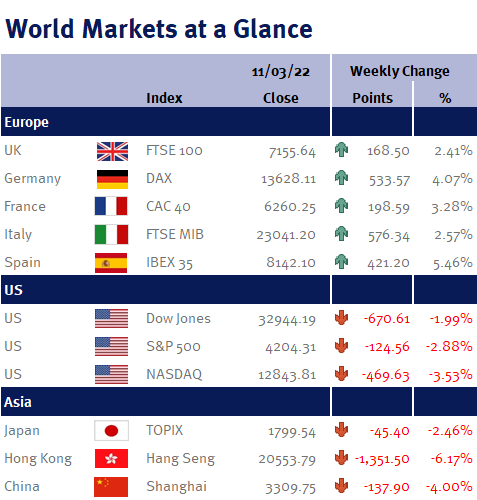And if you couple this with the big jump we have seen in energy prices (which doesn’t just push up costs of fuel at the petrol station – oil accounts for a large proportion of the total cost to produce all sorts of everyday products from plastics, household products, clothes, food and metals) we are now facing the prospect of much higher inflation.
But in times like this, especially with the enormous volatility we are seeing in financial markets, some perspective is useful.
Despite the fact that inflation could go a lot higher over the coming year, we still believe that central banks will be cautious with interest rate increases as the threat to growth is greater than the risk of inflation becoming unanchored in the long-term.
This is because the Russia’s invasion has, in effect, imposed a tax on consumers around the world as we will all be forced to pay more for our everyday essential goods and services, meaning our discretionary spending will drop as our already stretched budgets are unable to stretch any further – and as the consumer accounts for around 60% of the UK economy, and two-thirds of the US economy.
As a consequence, whilst we aren’t expecting policymakers to sit on their hands and do nothing, we would expect central banks will want to show they want to fight inflation by tightening monetary policy, but given they won’t want to put the economic recovery at risk, policymakers are unlikely to aggressively increase interest rates to fight inflation, especially as central banks can’t control this type of inflation with higher interest rates – higher interest rates won’t make oil come out of the ground any faster, or harvests more crops.
Thankfully, this thought process was evident yesterday when Christine Lagarde, the ECB President, said that the European Central Bank will speed up the pace of which it is winding down monetary stimulus (its €270bn QE program will now be just €90bn and end during the second quarter of 2022), but at the same time made it clear that instead of increasing Eurozone interest rates “shortly” after ending QE, it will now be “sometime after” – implying there will be a longer wait for an interest rate increase.
And this scaling back in policymakers planned aggressive interest rate increases should be positive for global equity markets.
Additionally, while we will undoubtedly see more persistent and noticeable inflation than we have all gotten used to, the current ‘artificial’ inflationary pressures will quickly become next year’s ‘base effect’ – meaning we should see inflation numbers fall sharply once the war-induced oil-shock is behind us.
Looking ahead to this coming week, Fed policymakers meet on Wednesday 16 March 2022 and are highly likely to increase interest rates to avoid losing inflation credibility, but may choose a 0.25% increase rather than the 0.5% increase they had previously been suggesting. Then on Thursday BoE policymakers meet, followed by the BoJ policymakers on Friday.
Additionally, we have UK employment data (unemployment rate and weekly earnings); the Empire State manufacturing survey; US retail sales; US housing data; US & Chinese industrial production; and Japanese CPI.
Investment Management Team


